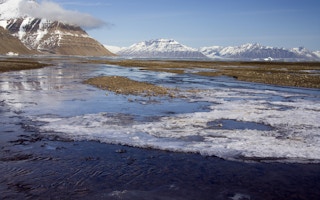The so-called, and much debated, hiatus in global warming may never have happened, according to new research.
The scientists say there is no substantive evidence for a recent flattening of the curve in the increase in global average temperatures: in other words, no pause, no slowdown in global warming. “We suggest,” they add, “that the use of those terms is therefore inaccurate.”
But first, and briefly, the story so far. In the 1990s, planetary temperatures rose steadily, reaching a then all-time high in 1998. In the 21st century, temperatures on average continued to rise, but the rate of increase seemed to be lower. Even so, 13 of the 14 hottest years ever have happened this century, and 2014 was the hottest year ever.
Denialists, sceptics and contrarians seized on the apparent slowdown and claimed that global warming had stopped. And teams of climate scientists were drawn, like moths to a flame, again and again to the question of whether there really was a slowdown − and, if so, why.
Unexplained data
They kept doing so because that is how science works: researchers worry away at unexplained data. They evaluate each other’s hypotheses, try to kick them to death, and then propose an alternative.
So, in the course of the last three years, scientists have variously accepted that global warming was never going to proceed at a steady, inexorable rate, that some Atlantic Ocean cycle might be at play to damp atmospheric temperatures, or that the heat might have disappeared into the Pacific depths.
They have also proposed that an increase in volcanic activity may have masked solar radiation, and that extremes of temperature were on the increase even if the average appeared not to be rising intemperately.
One group looked at the data again and decided they could see no slowdown, and another team confirmed their finding using a different approach.
Now Stephan Lewandowsky, a cognitive psychologist at the University of Bristol in the UK, and colleagues have joined the argument.
“
Our study raises the question: why has so much research been framed around the concept of a ‘hiatus’ when it does not exist?
Stephan Lewandowsky, cognitive psychologist at the University of Bristol
They say in the online journal Scientific Reports that they examined 40 peer-reviewed scientific articles published between 2009 and 2014 that specifically address the idea of a “hiatus” and could find no definition of a hiatus, or agreement about how long it might have lasted.
Simple reason
They looked at the data discussed in the papers and matched it with other trends in the entire record of global warming.
And then they decided that if the period of the review of evidence was 12 years or less, anyone looking for a hiatus was liable to find one − for the relatively simple reason that small samples don’t provide enough statistics to tell the whole story.
Professor Lewandowsky says: “Our study raises the question: why has so much research been framed around the concept of a ‘hiatus’ when it does not exist?
“The notion of a ‘pause’ or ‘hiatus’ demonstrably originated outside the scientific community, and it likely found entry into the scientific discourse because of the constant challenge by contrarian voices that are known to affect scientific communication and conduct.”
He concludes: “Therefore, scientists should avoid the use of ‘pause’ or ‘hiatus’ when referring to fluctuations of global mean surface temperature around the longer-term warming trend. There is no evidence for a pause in global warming.”










